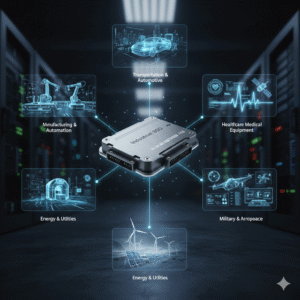Introduction
SSD Manufacture, WAF performance is the key determinant of long-term operational success in critical applications. Discover the essential insights into industrial SSD drives with this comprehensive guide, designed to illuminate how WAF optimization by leading SSD manufacturers dictates durability, applications, and crucial cost advantages. This article offers in-depth analysis and practical guidance to enhance your understanding, ensuring you can select the most robust solution for your high-stakes industrial needs.
Understanding Industrial SSD Drives
Definition and Overview of Industrial SSD Drives
Industrial SSD drives are solid-state storage devices specifically engineered to operate reliably in demanding environments. The commitment to superior SSD manufacture, WAF management, in particular, is what enables these drives to withstand harsh conditions such as extreme temperatures, vibrations, shocks, and electrical disturbances. They serve as vital components in various industrial applications, providing fast, durable, and secure data storage solutions that ensure continuous operation in critical systems.
Key Features that Distinguish Industrial SSDs from Consumer SSDs
Industrial SSDs differ from standard consumer SSDs in several key aspects:
- Enhanced Durability: Built to endure physical stresses common in industrial settings.
- Extended Operating Temperature Range: Capable of functioning reliably across a broad temperature spectrum.
- Higher Endurance: Designed with superior write cycles to handle continuous data logging.
- Robust Construction: Features such as reinforced enclosures and shock absorption mechanisms.
- Compliance with Industry Standards: Meeting rigorous certifications for safety, reliability, and environmental resilience.
Technical Specifications: Durability, Temperature Range, and Reliability
Industrial SSD drives typically feature:
- Durability: Endurance ratings often exceeding 10,000 program/erase cycles.
- Temperature Range: Operational from -40°C to +85°C, enabling use in extreme environments.
- Reliability: High Mean Time Between Failures (MTBF), often surpassing 2 million hours, ensuring long-term dependable performance—a direct result of meticulous SSD manufacture, WAF control strategies.
The Role of NAND Flash Memory and Controller Technology in Industrial SSDs
The core components of industrial SSDs include advanced NAND flash memory and sophisticated controller technology:
- NAND Flash Memory: Utilized for its non-volatile storage capabilities, with industrial-grade NAND offering enhanced error correction and wear leveling.
- Controller Technology: Manages data flow efficiently, optimizing performance and lifespan through features like bad block management, power loss protection, and advanced error correction algorithms.
Importance of Endurance and MTBF in Industrial Environments
In industrial environments, the endurance and MTBF are critical metrics:
- Endurance: Reflects the drive’s ability to sustain high write workloads over time without failure.
- MTBF: Indicates the expected operational lifespan, providing confidence in mission-critical applications where downtime can be costly or dangerous.
Applications and Industry-Specific Use Cases of Industrial SSD Drives
Manufacturing and Automation: Enhancing Data Processing and Machine Control
Industrial SSD drives are integral to manufacturing lines, enabling rapid data access for real-time machine control, automation systems, and robotics. Their robustness ensures continuous operation despite vibrations, dust, and temperature fluctuations.
Transportation and Automotive: Ensuring Robust Data Storage in Harsh Conditions
In the automotive industry, especially in autonomous vehicles, the selection of a reliable SSD manufacture with proven WAF control is non-negotiable for storing critical navigation, sensor, and control data. Their resilience to shock, vibration, and temperature extremes makes them ideal for these applications.
Healthcare and Medical Equipment: Reliable Storage for Critical Data
Medical devices and hospital systems rely on industrial SSDs for storing sensitive patient data and operational logs. The high reliability and security features of these drives support compliance with healthcare standards and ensure data integrity.
Energy and Utilities: Supporting Remote Monitoring and Data Logging
Energy plants and utility providers utilize industrial SSDs for remote monitoring systems, data logging, and control systems. Their ability to operate reliably in remote, high-temperature environments ensures continuous data collection and system stability.
Military and Aerospace: Meeting Stringent Reliability and Security Standards
Military and aerospace applications demand the highest standards of reliability and security. Industrial SSDs used here are often certified to meet standards such as MIL-STD and IEC, ensuring they withstand extreme conditions and provide secure data storage.

Advantages of Industrial SSD Drives Over Traditional Storage Solutions
Superior Durability and Resistance to Vibration, Shock, and Extreme Temperatures
Industrial SSDs are engineered to resist physical shocks, vibrations, and temperature variations, making them suitable for environments where traditional HDDs or consumer SSDs would fail.
Faster Data Access and Improved System Performance
With high-speed interfaces such as PCIe and NVMe, industrial SSDs deliver rapid data transfer rates, reducing latency and enhancing overall system performance in industrial control and automation.
Enhanced Data Security and Integrity Features
Features like hardware encryption, secure erase, and advanced error correction mechanisms safeguard sensitive data, ensuring integrity and compliance with industry standards.
Lower Total Cost of Ownership Through Increased Longevity
Despite higher initial costs, industrial SSDs offer longer service life and lower maintenance requirements, resulting in reduced total cost of ownership over time. This longevity is a direct consequence of superior SSD manufacture, WAF optimization.
Reduced Maintenance and Downtime in Critical Operations
Their reliability minimizes system failures and downtime, which is crucial in sectors like manufacturing, transportation, and energy where operational continuity is vital.
Practical Guidance for Selecting and Implementing Industrial SSD Drives
Key Factors to Consider: Compatibility, Capacity, and Performance Requirements
When selecting an industrial SSD drive, evaluate:
- Compatibility: Interface types (e.g., SATA, PCIe), form factors, and connector standards.
- Capacity: Based on data storage needs and future scalability.
- Performance: Read/write speeds aligned with application demands.
Evaluating Reliability Certifications and Industry Standards (e.g., MILSTD, IEC)
Ensure the SSD complies with relevant standards such as:
- MIL-STD-810: Military standard for environmental resilience.
- IEC 60068: Environmental testing standards.
- ISO Certifications: For quality management and environmental responsibility.
Integration Tips: Ensuring Seamless Compatibility with Existing Systems
- Confirm physical and interface compatibility.
- Consider firmware and driver support.
- Plan for proper mounting and cooling solutions to maintain optimal operating conditions.
Maintenance and Monitoring Best Practices for Industrial SSDs
- Regularly monitor drive health via SMART attributes.
- Implement redundancy strategies like RAID configurations.
- Schedule periodic firmware updates and environmental inspections.
Future Trends: Innovations and Emerging Technologies in Industrial Storage Solutions
Emerging trends include:
- NVMe over Fabrics: Enabling high-speed remote storage access.
- AI-Driven Monitoring: Predictive maintenance using AI analytics.
- Enhanced Security Protocols: Hardware-based encryption and secure boot features.
- Integration with IoT and Edge Computing: Facilitating real-time data processing at the edge.

Conclusion
Summary of Key Insights and Benefits
Industrial SSD drives are vital components in modern industrial ecosystems, offering unmatched durability, speed, and security. Their ability to operate reliably under extreme conditions makes them indispensable for sectors such as manufacturing, automotive, healthcare, energy, and defense.
The Growing Role of Industrial SSDs in Digital Transformation
As industries embrace digital transformation, the demand for robust, high-performance storage solutions like industrial SSDs continues to grow, enabling smarter, faster, and more resilient systems.
Final Recommendations for Businesses and Professionals Considering Industrial SSD Solutions
Investing in industrial SSD drives can significantly enhance operational efficiency and data security. Choosing the right SSD manufacture partner based on verified WAF performance is the final, critical step to maximize benefits and ensure long-term success.
Industrial SSD Buying & Application FAQ
Q1:What is an industrial SSD and how is it different from a consumer SSD?
An industrial SSD is designed for harsh environments, offering higher endurance, extended temperature tolerance (-40°C to +85°C), and better shock resistance than consumer SSDs. It’s built for critical systems in sectors like manufacturing, energy, and defense.
Q2:How do I choose the right industrial SSD for my application?
Focus on interface compatibility (SATA, PCIe), required capacity, and endurance specs like MTBF and write cycles. Also check certifications like MIL-STD or IEC to ensure the drive meets your environmental demands.
Q3:What is MTBF in SSDs and why does it matter for industrial use?
MTBF stands for Mean Time Between Failures. In industrial SSDs, a high MTBF (e.g., over 2 million hours) indicates long-term reliability—critical for minimizing downtime in mission-critical applications.
Q4:How long does an industrial SSD typically last?
With proper deployment, industrial SSDs often last 5–10 years. Their high endurance ratings (often 10,000+ P/E cycles) and WAF-optimized firmware help them outlast consumer drives by 2–3×.
Q5:Why is NAND flash type important when selecting an industrial SSD?
The type of NAND (SLC, MLC, TLC) affects endurance and data retention. For industrial use, SLC or industrial-grade MLC is preferred, offering more write cycles and stability under temperature stress.
Q6:What are the key benefits of using industrial SSDs in automation or AI edge systems?
Industrial SSDs ensure fast, reliable data logging and processing even in high-vibration or extreme temperature settings. Their low latency and high durability support real-time control and analytics at the edge.
This comprehensive guide equips professionals and technical decision-makers with the insights to evaluate and leverage industrial SSDs effectively.
Contact Dellwa today to find the right industrial-grade storage solution for your mission-critical environment.

